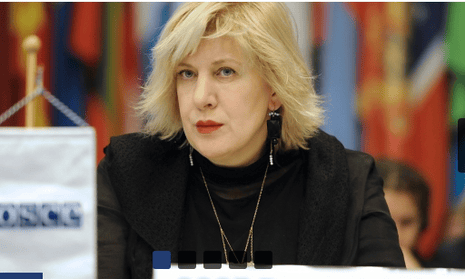British politicians attempting to undermine the independence of the BBC should be careful what they wish for.
Public service broadcasting is precious and its credibility depends on it not only being at arm’s length from the government of the day, but being perceived as such.
The BBC is admired abroard precisely because it has, thus far, managed to avoid becoming an arm of the state, a fate that has befallen several supposedly independent broadcasting outlets in eastern Europe.
In the communist era, state TV and radio services acted on behalf of the government, which financed them, selected their managements and maintained strict censorship over content.
In the aftermath of the collapse of communist regimes, privately owned media filled the vacuum during a period in which state broadcasters were reorganised, often with guidance from the European Union.
Dunja Mijatovic, the human rights advocate who is the OSCE’s representative on freedom of the media*, points out that in some cases the transformation of state television into a public one was a condition of these new democracies becoming member states of the Council of Europe.
Commitment to an authentic public service remit was assumed to be crucial to becoming a candidate for EU entry. But “developments in younger EU member states”, writes Mijatovic, show that claims to public service “can be misused.”
There has been considerable backsliding in the battle to establish credible public service broadcasters in transitional democracies. And she lists some examples:
Poland: In December 2015, the Polish parliament adopted a law giving the treasury minister the mandate to appoint and dismiss members of management and supervisory boards. Since the law came into effect in January this year, more than 100 journalists in public media have lost their jobs, allegedly for not being government-friendly.
Croatia: Its parliament first dismissed the director general of the radio and television broadcaster and then, a week later, the government proposed that parliament should reject a report by the independent media regulator. Both events raised serious concerns about the country’s media freedom.
Hungary: Post-communist public service broadcasting was, in effect, turned back into state broadcasting. New media laws in 2010 led, within a year, to all public service media being subordinated to political decisions. The governing party was able to nominate all new heads of public service media and the Media Authority controls the budgets.
Bosnia: The steering board of Bosnia & Herzegovina Radio and Television decided last month to stop broadcasting from 30 June because of its critical financial situation. BHRT relies mainly on funds from a TV licence fee that is paid by only 50% of Bosnia’s citizens.
In other words, in these countries, and several others, there is a desire to recreate the “state broadcaster” model.
There are lessons here for Britain that the government, especially culture secretary John Whittingdale, should take on board. Its wish to change the way the BBC is governed by packing the board with its own appointees raises questions of impartiality. The BBC has never been, and should not be, a “state broadcaster”, neither in practice nor in perception.
Government control exercised through its planned unitary board takes the UK closer to eastern European models, even allowing for the fact that the government already appoints the chair and deputy chair overseeing the BBC. Is this really the direction of travel Britain should be taking?
At least, for the foreseeable future, the BBC’s funding mechanism, the licence fee, will continue. Under-funded public service broadcasting carries its own dangers, as Mijatovic argues.
To read her recipe for curing the problem in east European and Balkan countries, see her excellent article on the Index on Censorship site.
*In the original posting, Dunja was described as being the former representative. In fact, her mandate has been extended.

Comments (…)
Sign in or create your Guardian account to join the discussion